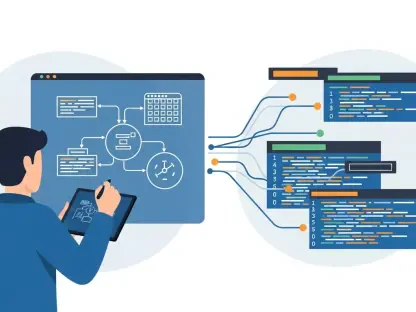Overview of the App Modernization Landscape
Imagine a world where businesses are racing against time to transform their outdated applications, only to find that 67% of organizations struggle to meet their modernization goals due to skill gaps and operational friction. This stark reality defines the current state of application modernization, an urgent priority for companies striving to keep pace with technological advancements and heightened customer expectations. As digital transformation accelerates, the pressure to update legacy systems into agile, cloud-native solutions has never been more intense, pushing platforms like Heroku, a Salesforce-owned Platform-as-a-Service (PaaS), into the spotlight as potential game-changers.
The industry today is characterized by a complex interplay of rapid development demands and intricate multicloud environments. Organizations face the dual challenge of aligning with regulatory requirements while integrating cutting-edge technologies such as artificial intelligence (AI) and Kubernetes-based architectures. Amid this backdrop, the role of PaaS solutions becomes critical, offering a way to simplify infrastructure management and empower developers to focus on innovation rather than operational burdens.
This report delves into how Heroku is positioning itself within this dynamic landscape, addressing the pressing needs of businesses through streamlined workflows and forward-thinking strategies. By examining market trends, challenges, and future projections, the analysis aims to uncover the broader implications for app modernization and the pivotal role that such platforms play in shaping the industry’s trajectory.
Key Trends and Market Dynamics in App Modernization
Emerging Trends and Technological Shifts
The app modernization sector is undergoing a profound transformation, driven by a surge in accelerated development cycles that demand faster software releases without compromising quality. Cloud-native architectures, particularly those leveraging Kubernetes, have emerged as a cornerstone of this shift, enabling scalability and flexibility that traditional systems often lack. Platforms like Heroku are aligning with these advancements, providing developers with tools to navigate complex environments while minimizing setup time.
Another significant trend is the integration of AI into both coding processes and application functionalities. From AI-assisted development tools that enhance productivity to embedded AI agents within apps, this technology is reshaping how software is built and deployed. Additionally, a security-first mindset through DevSecOps is gaining traction, as companies recognize the need to embed protective measures from the initial stages of development, a practice that Heroku actively supports with automated compliance and integrity checks.
Developer behaviors are also evolving, with a growing demand for platform-centric solutions to bridge skill gaps and reduce operational friction. As teams prioritize speed, the industry is witnessing a shift toward generalist skill sets over specialized expertise, reflecting a broader need for adaptability. Heroku’s focus on abstracting infrastructure complexities directly addresses this trend, enabling developers to concentrate on value creation rather than logistical challenges.
Market Performance and Growth Projections
Current market data paints a revealing picture of the app modernization landscape, with research indicating that 67% of organizations rely on generalists to drive their modernization efforts. Yet, a significant disparity exists between ambition and execution, as only 8% achieve hourly code release frequencies compared to 24% that aspire to do so. This gap underscores the operational and skill-related hurdles that continue to impede progress.
Looking ahead, projections suggest a robust increase in the adoption of PaaS solutions over the next few years, with platforms like Heroku expected to play a central role in facilitating this growth. The market for AI-driven development tools is also anticipated to expand significantly, as businesses seek to leverage automation for efficiency. Cloud-native technologies are forecasted to dominate, with widespread integration expected by 2027, further cementing the importance of adaptable platforms in meeting these demands.
These trends point to a burgeoning opportunity for Heroku to solidify its position as a leader in reducing developer friction and enhancing deployment speeds. As investment in modernization initiatives continues to rise, the platform’s ability to align with emerging needs will likely determine its impact on the industry’s future growth trajectory.
Challenges in Modernizing Applications
The path to application modernization is fraught with obstacles, chief among them being the complexity of fragmented multicloud environments that often overwhelm development teams. Managing diverse systems while ensuring seamless integration poses a significant barrier, frequently leading to delays and inefficiencies. This intricacy is compounded by the need to maintain consistent performance across various cloud providers.
Skill shortages represent another critical challenge, as many organizations lack the specialized talent required to navigate modern tools and architectures. This deficiency creates bottlenecks in innovation, with teams struggling to balance the imperatives of speed, quality, and regulatory compliance. The resulting strain on resources often hinders the ability to deliver timely updates or adopt new technologies effectively.
Heroku aims to mitigate these issues by offering a streamlined approach that abstracts infrastructure complexities, allowing developers to focus on coding rather than system management. By providing intuitive workflows and reducing cognitive overhead, the platform seeks to alleviate the pressure on teams, enabling them to overcome these persistent hurdles and drive modernization efforts forward with greater confidence.
Regulatory and Security Considerations in App Development
Compliance with data protection laws and industry standards has become a non-negotiable aspect of app development, especially as cyber threats grow in sophistication and frequency. Regulations demand stringent measures to safeguard user information, influencing every stage of the development lifecycle. Businesses must navigate this landscape carefully to avoid penalties and maintain customer trust.
Security, therefore, is no longer an afterthought but a foundational element, with DevSecOps practices being integrated from the earliest phases of planning through to ongoing operations. Heroku addresses this need by embedding security protocols from Day 0 to Day 2, ensuring software supply chain integrity through mechanisms like automated vulnerability checks and consistent build processes. This proactive stance helps mitigate risks before they escalate.
The interplay between regulatory demands and development strategies also shapes platform offerings, as seen in Heroku’s automation of compliance processes. Such capabilities reduce the burden on developers to manually address legal requirements, allowing focus to remain on innovation. As threats evolve, the emphasis on robust security frameworks will only intensify, making platforms that prioritize these considerations indispensable to the industry.
The Future of App Modernization with Heroku’s Vision
Emerging technologies like AI-native development and managed inference for large language models are set to redefine the contours of app modernization, with Heroku actively supporting these advancements. By facilitating AI integration, the platform enables developers to harness cutting-edge tools for coding efficiency while building applications that incorporate sophisticated AI functionalities. This dual approach positions it at the forefront of technological progress.
Potential disruptors, such as the open-source movement and shifting consumer preferences for faster, more secure applications, are also influencing the direction of modernization. Heroku’s alignment with cloud-native principles, including support for Kubernetes, reflects an understanding of these dynamics, ensuring relevance in a landscape increasingly dominated by community-driven solutions. This adaptability is crucial for maintaining a competitive edge.
Global tech and economic trends further underscore the importance of developer experience, which Heroku prioritizes through simplified workflows and reduced operational friction. As markets demand rapid innovation, the platform’s vision of empowering teams to deliver value quickly while navigating complex environments offers a glimpse into a future where modernization is both accessible and sustainable for businesses of all sizes.
Reflections and Future Pathways
Looking back, the exploration of Heroku’s role in app modernization revealed a landscape marked by both formidable challenges and transformative opportunities. The platform stood out for its commitment to reducing developer friction, embedding security from the ground up, and integrating AI and cloud-native trends to meet industry demands. These efforts highlighted a clear path for addressing the complexities that once hindered progress.
Moving forward, organizations are encouraged to leverage platforms like Heroku to build sustainable modernization strategies, focusing on scalability and compliance as core pillars. Investing in developer-centric tools that streamline workflows emerges as a critical step to bridge skill gaps and enhance productivity. Additionally, staying attuned to evolving security threats calls for continuous adaptation of robust DevSecOps practices.
As the industry navigates this dynamic terrain, the emphasis shifts to fostering innovation through collaboration and embracing emerging technologies. Heroku’s strategic positioning offers a blueprint for balancing speed with stability, suggesting that the next phase of app modernization will hinge on empowering teams with the right resources. This focus on actionable solutions paves the way for a more resilient and agile future in application development.









